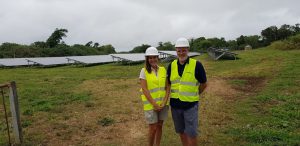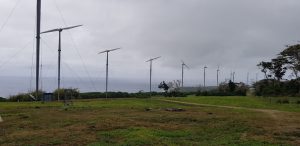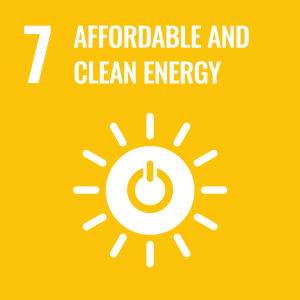By Dr Maria Noguer, Climate Programme Manager, Institute for Environmental Analytics (IEA)
When we first tuned up in the Seychelles in 2018 to explain to our project partners that a combination of space data and our expertise could help them transition to a low carbon economy, they looked at the sky and then at us with suspicious eyes. Space sounded esoteric but they were intrigued and excited.

Solar farm in Vanuatu (Maria Noguer and Alan Yates on a site visit)
Addressing grand challenges: high cost of energy and climate change
The Institute for Environmental Analytics had just been awarded a 4-year grant by the UK Space Agency to ‘develop a space-based solution to address grand challenges in developing countries.’ Seychelles, together with another six Small Island States, became our partners in the project. These countries face significant financial and environmental challenges: high dependency on imported fossil fuel with the associated high cost of energy, and high vulnerability to the impact of climate change – both challenges can be helped by implementing renewable energy. That was the grand challenge for our project, RE-SAT: To develop a tool that could help countries transition from fossil fuel to renewable energy generation.
RE-SAT is our innovative new energy analytics platform to help policy makers and planners make evidence-based decisions about the deployment of renewable energy, making best use of all available environmental data, Earth Observation, ground weather measurements and modelling techniques. The software platform allows users to access these enhanced datasets and use them to provide improved renewable energy resource estimates to secure investment.
Making the most of University of Reading solar facilities
We are lucky at University of Reading to have several solar rooftop facilities. The project will take advantage of these in-house facilities which will allow us to validate our power simulations with real-time production data from these facilities. In addition, we will be observing how the clouds move over the solar panels with a new sky camera that have just been installed at the Edith Morley building. This camera is like having an extra pair of eyes always gazing at the sky and clouds. What a great job!

Wind Farm in Vanuatu
Contributing to “Affordable and Clean Energy” (SDG7)
RE-SAT is supporting the transition towards low carbon energy and contributing towards two key aspects: energy reliance and climate change mitigation. Increasing the use of renewable energy on island states will improve energy security and tackle climate change, leading ultimately to a more sustainable economic growth. But perhaps better to hear it from someone else. Here is what the British High Commissioner to the Seychelles back in 2018, Her Excellency Caron Rohsler, said at the launch of our pilot of RE-SAT: “I am delighted that the UK, through the UK Space Agency grant and the expertise of the Institute for Environmental Analytics, is at the forefront of helping Seychelles to switch to green energy. As we have heard this is about gathering and correctly analysing the right data to identify the most suitable mix of renewable energy sources – solar, wind and wave – to provide a reliable supply and build the right infrastructure to deliver it.”


